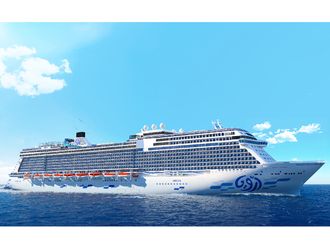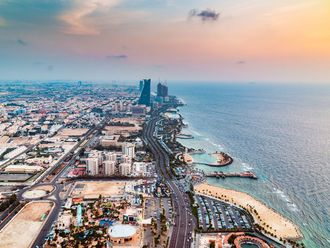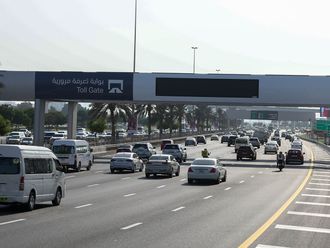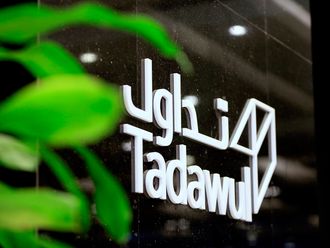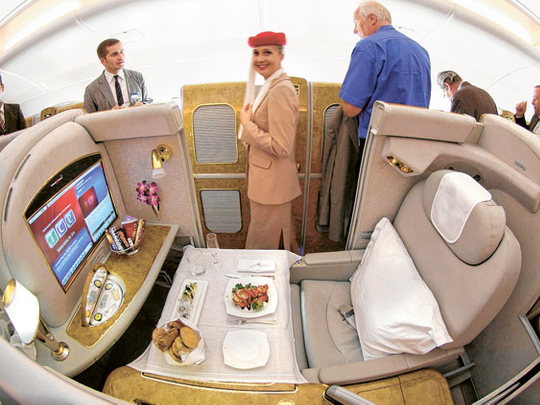
Dubai: For a single return ticket price of Dh44,175, a frequent flier rests in the sanctuary of his first-class private suite aboard an Emirates A380 superjumbo cruising from Dubai to Toronto at 36,000 feet.
Feeling invigorated by a hot shower moments earlier, he studies a first-class dinner menu touting main courses such as braised beef in coconut milk or duck breast glazed with wild forest honey.
One of 1,200 TV channels is broadcasting on a 23-inch screen in the cabin while the seat beneath him massages away the stress of long-haul travel.
After dinner, the seat will be converted by flight attendants into a full bed behind the closed door of the cabin.
On a long-haul Etihad Airways flight from Abu Dhabi to Sydney, flight crews are presenting first-class passengers with what the airline calls "amenity kits", which include a black cosmetic purse with crystals by Swarovski for women and for men a black leather cufflink box. Etihad first-class guests also discover complimentary high-end male and female loungewear to make the trip even more comfortable.
By all accounts, first-class passenger load factors from emerging markets such as the Middle and Far East are growing steadily, a trend that is in stark contrast to shrinking demand in the West on some long-haul and domestic routes.
To answer demand for cheaper fares in tough economic times, some airlines such as Air Canada, British Airways and Air France are making headlines for reducing or eliminating first-class seating on some routes to make more room for premium and economy seats that make money.
Critical
Boosting the bottomline has become ever more critical for airlines facing rising fuel costs that are eating into thin profit margins. Chris Goater, manager for corporate communications at the International Air Transport Association (Iata), said that emerging market airlines are performing better when it comes to first-class.
"The trend we have seen is for airlines in emerging markets to have stronger demand for first-class travel than with airlines in mature markets," Goater said. "Hard to say why, but this could be [due to] air travel becoming ‘commoditised‘ — in other words, no longer regarded as a luxury.
"Thus in mature markets passengers are looking more towards business or economy travel. A first-class seat costs ten times more than an economy seat, so clearly if the airline can fill first-class it will have a strong profit margin on those seats.
Falling demand
"However, as demand has fallen, it has been easier to move to a business-class seat [five to seven times more expensive] which offers a better balance of margin and load factor."
Emirates, meanwhile, said it is not only maintaining first-class services but expanding upon them.
"Our first-class seats are performing well, and we will continue to invest in the development of both first- and business-class services," an Emirates spokesperson told Gulf News.
"First class is a critical component of Emirates' current and planned growth — both in the aircraft purchased and in the subsequent fit-outs; the expanding network of dedicated Emirates Lounges and chauffeur-driven transfers around the world; and even specialised services such as the first-ever Emirates Water Limousines in Venice." It is certainly not considering cutting back on its first-class cabin seating.
"Our product offering and service is extremely strong and continues to resonate with high-end travellers who have not curbed the luxury and style of travel they are used to," said the spokesperson.
"We have made a significant investment in our first-class product and service, to cater to the discerning traveller who seeks a certain style of travel. We are confident that our first-class offering will continue to be sought after."
Emirates' confidence remains strong as evident in the company's order book for new aircraft. "The fact that the new aircraft we have on order are all within the three-class configuration is a reflection of that sentiment," said the spokesperson.
In Abu Dhabi, Etihad Airways said it continues to place top emphasis on first-class service.
"Our premium product is important to us commercially," said an Etihad spokesperson.
"First class is as significant in maintaining our brand as our economy product, as well as being vital to our goal of being the world's leading airline.
"There is no doubt that first-class travel declined during the global financial crisis... but we are seeing demand return.
Product mix
"We are always looking at our mix of products to ensure we have the configurations the market wants. We actually operate three-class, two-class and full service all-economy aircraft which means we have the flexibility to match the right aircraft to the right market.
"Where there is no demand for premium traffic, we offer all-economy; where there is demand for first class, we have the aircraft to suit that demand. There is certainly a strong market from the GCC for first-class travel, particularly on our long-haul routes to North America, Europe and Australia, which are very healthy."
Etihad said first class is one of the keys to maintaining a successful brand.
"Offering a first-class service is also very important from a brand proposition perspective — we are, after all, a premium airline, and the flagship airline of the capital of the UAE. But we know the service has to keep evolving to ensure it is fresh and interesting, and that we are anticipating the changing needs of the market."
Etihad announced that first- and business-class guests with two- or three-night layovers in Abu Dhabi are now being offered complimentary luxury hotel stays during their time in the UAE.
At no extra cost, Etihad said its passengers will enjoy complimentary breakfast and chauffeur-driven transfers between selected airports and chosen hotels.
Peter Baumgartner, Etihad Airways' chief commercial officer, said in a statement that the deals "are designed to appeal to premium travellers who are able to take advantage of breaking their travel schedule and visiting either Abu Dhabi or Dubai. We have worked closely with a number of luxury hotels in both cities and this promotion provides our premium guests with tremendous value and opportunity."



